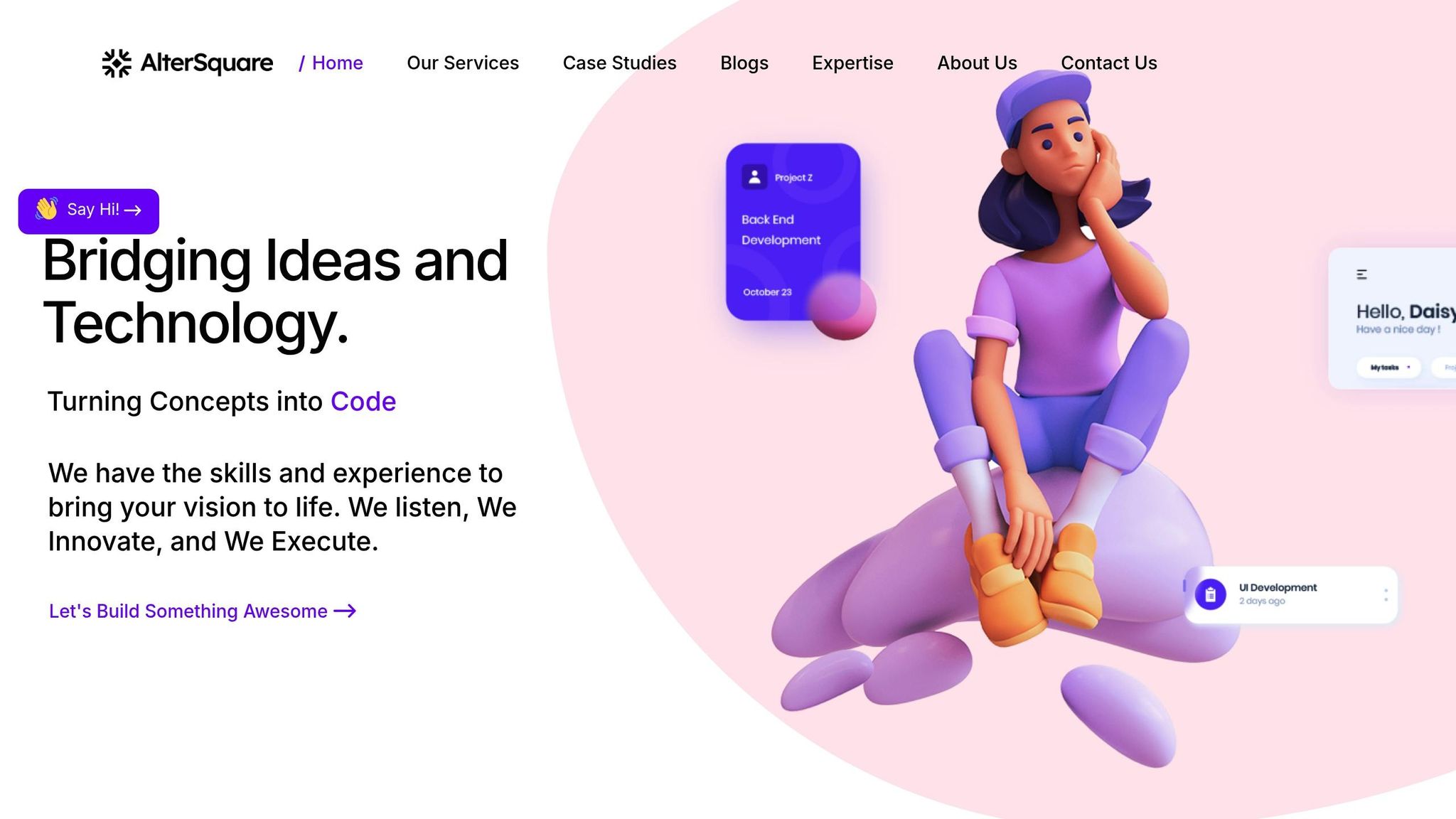Why Most Startups Fail at Technical Hiring (And How Outsourcing Solves It)
Taher Pardawala August 18, 2025
Startups often struggle with technical hiring due to limited resources, intense competition, and mismatched expectations. These challenges lead to delays, overworked teams, and costly mistakes. Outsourcing offers a solution by providing access to pre-vetted engineering teams, faster project launches, and cost-effective scalability. Companies like AlterSquare streamline this process with ready-to-go teams and structured frameworks, helping startups build products efficiently without long hiring cycles or high overhead costs.
Key takeaways:
- Hiring challenges: Lack of resources, competition with big companies, and long recruitment cycles.
- Outsourcing benefits: Quick access to skilled engineers, lower costs, and faster delivery.
- AlterSquare’s approach: Pre-assembled teams, 90-day MVP programs, and flexible team scaling.
Outsourcing helps startups focus on their product while avoiding the pitfalls of traditional hiring.
Finding Developers For Your Startup: Insource Vs Outsource?
Main Problems Startups Face When Hiring Technical Talent
Hiring technical talent is a tough nut to crack for startups, and the challenges they face are often unique compared to established companies. It’s not just about tight budgets – these hurdles can directly affect how quickly and effectively a startup can bring its product to market.
Founders and Candidates Want Different Things
Startups often run into trouble because founders and candidates are looking for completely different things. Founders typically want engineers who can wear many hats, juggle multiple technologies, and pivot quickly when priorities shift. On the flip side, candidates often prefer roles with clear responsibilities, room for specialization, and a predictable career path.
This mismatch becomes especially apparent during salary discussions. Founders might emphasize equity packages and the promise of rapid growth, but many engineers prioritize immediate financial security, like higher base salaries. To make matters worse, if founders lack technical expertise, they might make hiring decisions based on incomplete evaluations. All these factors can slow down product development and make it harder to build a strong technical team.
Top Engineers Choose Big Companies Over Startups
Big tech companies have a clear edge when it comes to attracting top talent. They offer perks like comprehensive health insurance, retirement plans, paid time off, and professional development budgets – things that most startups simply can’t compete with.
The financial gap is another major issue. Large corporations typically provide higher base salaries, along with bonuses and stock options that are more immediately rewarding than the equity packages startups offer. For candidates who are risk-averse, the stability and benefits of a corporate job often outweigh the potential long-term rewards of joining a startup. This forces startups to get creative with their hiring strategies, but the competition still makes it tough to secure the best talent.
Bad Hires Cost Too Much Money and Time
For startups, a single bad hire can be a costly mistake. Unlike big companies that can absorb the impact, startups feel the strain immediately. Bad hires drain resources through salaries, training, and lost productivity, which are difficult to recover.
Even worse, if a bad hire produces subpar code, it creates technical debt that can haunt the company down the line. Fixing these issues later often takes more time and money than doing it right from the start. And when a hire doesn’t work out, startups have to start the recruitment process all over again, further delaying progress on critical projects.
Existing Team Members Get Overworked During Long Hiring Cycles
When hiring drags on, the burden falls on the existing team, and this can lead to burnout. Engineers end up juggling their regular workload with recruitment tasks, which takes a toll on productivity and morale.
This creates a vicious cycle. Overworked team members become less efficient, which increases the pressure to bring in new hires. But the longer the hiring process takes, the more strained the team becomes. Important tasks like code reviews and documentation might get rushed, leading to long-term problems that require even more resources to fix. In some cases, the stress of prolonged hiring cycles can lead to team members leaving, further complicating the startup’s ability to build and maintain a stable, productive team.
Why Standard Hiring Methods Don’t Work for Startups
Traditional hiring methods often require more time and resources than most startups can spare. This mismatch can slow down growth, inflate costs, and lead to high turnover – all of which are challenges startups can’t afford to face.
It Takes Too Long to Find and Hire Good Engineers
Conventional recruitment processes can drag on for months, but startups don’t have the luxury of time. With limited funds and tight deadlines, every delay in hiring can seriously impact progress.
Startups typically spend weeks sourcing and interviewing candidates, which can stall critical product development. Unlike established companies with well-known brands, startups often struggle to attract applicants, meaning they need to invest more time in outreach. Add to this the multi-step interview processes, which can be exhausting for both candidates and the hiring team, and the timeline stretches even further.
These prolonged cycles can lead to a vicious loop – if the right person isn’t hired quickly, the process starts all over again. Meanwhile, the clock is ticking. Market opportunities slip away, and the team is left scrambling to meet development goals without the talent they need.
Startups Can’t Afford to Pay Market Rates
Compensation is another major hurdle. Startups often can’t match the high salaries and extensive benefits offered by established tech giants, especially in major U.S. tech hubs. Senior software engineers, in particular, command steep paychecks that early-stage startups struggle to meet.
As a result, startups lean heavily on equity-based offers. While these may appeal to candidates with a long-term vision, they rarely address immediate financial needs, making it harder to attract top talent.
New Hires Leave Too Quickly
Frequent turnover is a costly and disruptive issue for startups. Misaligned expectations and insufficient onboarding often leave new hires unprepared for the fast-paced, often chaotic demands of startup life. This leads to frustration, early departures, and additional recruitment and training expenses.
The impact goes beyond just the financial cost. When employees leave, they take institutional knowledge with them, causing delays on projects and adding extra pressure on the remaining team. Cultural mismatches are another common problem. Engineers often join startups expecting a dynamic and innovative environment, only to encounter disorganization and unclear priorities. When reality doesn’t meet their expectations, many opt to move on to more stable opportunities, leaving startups to start the hiring process all over again.
sbb-itb-51b9a02
How Outsourcing Fixes Technical Hiring Problems
Outsourcing offers startups a practical way to sidestep hiring challenges that often drain time and money. Instead of slogging through drawn-out recruitment processes, startups can tap into networks of ready-to-go engineers. This not only simplifies hiring but also speeds up product development timelines.
Here’s where outsourcing truly shines:
Access to Pre-Screened Engineering Teams
Outsourcing partners maintain a roster of engineers who’ve already been through thorough vetting processes. These evaluations typically include technical tests, problem-solving exercises, and communication assessments. Background checks, security training, and compliance reviews are also part of the package, saving founders the hassle of doing it themselves. In fact, many outsourcing services can deliver pre-vetted developer profiles – complete with skill assessments and project histories – within just 48 hours [1].
Another major perk is the availability of specialized expertise that might be hard to find locally. Whether you’re looking for blockchain developers, machine learning engineers, or mobile app specialists, outsourcing partners can connect you with professionals who have deep experience in these areas. Many of these teams also include senior engineers with extensive experience on mission-critical projects. They not only help guide less experienced team members but also introduce best practices and the latest tech insights.
Faster Project Kickoffs and Scalable Teams
Outsourcing allows startups to hit the ground running. Pre-assembled teams can dive into projects almost immediately after an agreement is finalized, cutting out the delays associated with sourcing, interviewing, and onboarding individual hires.
This speed becomes even more valuable when project needs shift. Startups can quickly scale teams up or down based on current requirements, avoiding the logistical headaches of managing full-time staff. Need a specialist for a short-term task? Outsourcing lets you bring in experts for just the time required. This flexibility not only reduces operational risks but also keeps costs in check – an essential factor for startups.
Cost Savings and Predictable Budgets
Outsourcing often proves more budget-friendly than traditional hiring. Startups can sidestep many of the expenses tied to full-time employees, such as benefits, office space, equipment, and training. With clear, predefined rates for specific skills and time periods, budgeting becomes more straightforward, making it easier to allocate resources wisely.
How AlterSquare Solves Startup Hiring Challenges

AlterSquare takes the outsourcing concept to the next level, offering a specialized model that directly addresses the unique challenges startups face when building technical teams.
Through their engineering-as-a-service model, AlterSquare eliminates the headaches of technical recruitment. Instead of spending months hiring, you gain access to ready-to-go engineering teams that seamlessly integrate with your existing operations.
What sets AlterSquare apart is its focus on ownership and accountability. Their teams don’t just complete tasks – they take responsibility for delivering features and ensuring product success. This approach minimizes the common pitfalls of traditional outsourcing, such as communication breakdowns and mismatched expectations. As a founder, this allows you to focus on strategy and market growth while seasoned engineers handle the technical side.
Step-by-Step Process for Streamlined Development
AlterSquare uses a clear and structured I.D.E.A.L. framework to guide product development. Each phase – discovery, design, agile development, launch preparation, and post-launch support – lays the groundwork for predictable results.
- Discovery and Strategy: This phase involves in-depth market research, competitor analysis, and technical assessments. The team also creates user personas and recommends a tailored tech stack. By investing in this upfront work, startups can avoid costly course corrections later.
- Design and Validation: User experience takes priority here. Wireframes, mockups, and interactive prototypes are created and tested with real users. This helps identify usability issues early, before significant development begins.
- Agile Development: Using modern technologies like Vue.js, Nuxt.js, GoLang, and Node.js, AlterSquare builds scalable products. Agile cycles ensure steady progress and provide the flexibility to adapt based on user feedback.
- Launch Preparation: This phase ensures your product is ready for the real world. The team handles performance optimization, security, and deployment planning, so you can focus on scaling your business.
- Post-Launch Support: After launch, AlterSquare continues to provide maintenance and feature development. This allows your product to evolve based on real user data, fueling long-term growth.
This step-by-step process also powers AlterSquare’s rapid MVP program, designed to help startups launch quickly without sacrificing quality.
90-Day MVP Program for Fast Product Launches
AlterSquare’s 90-day MVP program is perfect for startups looking to hit the market quickly. By combining rapid prototyping, AI-driven development tools, and iterative testing, the program delivers a market-ready product in just three months, starting at $10,000.
Generative AI tools play a key role in this program, speeding up code generation, testing, and prototyping. This not only accelerates development but also keeps costs manageable.
The program includes built-in feedback loops at critical stages, ensuring that real user insights shape the product’s evolution. Additionally, tech stack consultations align your technology choices with your long-term business goals. For startups needing extra manpower, AlterSquare offers another solution to expand your technical team without the need for full-time hires.
Scale Engineering Capacity Without Full-Time Hiring
If your startup already has a technical team but needs extra bandwidth, AlterSquare offers engineering capacity augmentation. This flexible model lets you scale your resources without committing to full-time hires.
Augmented teams from AlterSquare work alongside your internal engineers, adapting to your project management tools and workflows. This collaborative setup ensures smooth communication and lets your team maintain control over product direction, while benefiting from additional expertise and manpower.
These teams don’t just deliver high-quality code – they also introduce best practices in areas like testing, deployment, and monitoring. Over time, this strengthens your internal capabilities.
With flexible engagement terms and custom pricing, AlterSquare gives you access to top-tier engineering talent when you need it, ensuring you only pay for the resources you actually use.
Conclusion: Build Better Products Through Outsourcing
Startups often grapple with two major hurdles: soaring engineering salaries and the lengthy delays that come with traditional hiring. These challenges make it difficult to scale quickly and efficiently.
Outsourcing offers a practical solution by granting immediate access to skilled engineering teams, capable of delivering results in weeks rather than months. This approach not only speeds up timelines but also reduces financial risks significantly.
For instance, hiring a senior full-stack developer in Silicon Valley can be incredibly costly when factoring in salary, benefits, and overhead. In contrast, outsourcing provides access to entire engineering teams at a fraction of the cost. Plus, these teams often bring established workflows and a track record of successful project delivery, ensuring accountability and efficiency.
Take AlterSquare’s 90-day MVP program as an example. Starting at $10,000, it eliminates protracted hiring processes by offering a structured I.D.E.A.L. framework to deliver a market-ready product, complete with support after launch.
For startups aiming to balance speed with quality, outsourcing isn’t just an option – it’s a smart strategy. It helps preserve precious resources while driving forward innovation. The most successful startups know that accelerating product development isn’t about building a massive team; it’s about having the right expertise at the right time. Outsourcing delivers that expertise without the overhead, risk, or delays of traditional hiring.
FAQs
How can outsourcing help startups tackle common challenges in technical hiring?
Outsourcing gives startups a smart way to tackle common technical hiring hurdles by tapping into a global pool of skilled professionals. It cuts down on the time-consuming recruitment process and lowers the chances of hiring the wrong fit. Plus, startups can expand their teams quickly to match project needs without dealing with the extra costs of in-house hiring, like office space, equipment, or long-term salaries.
Another big advantage is the flexibility that outsourcing offers. Startups can adjust team size and expertise as their needs evolve. This allows them to stay focused on their main business goals while benefiting from high-quality development, faster onboarding, and better cost management. It’s an effective way to avoid expensive hiring mistakes and build reliable, scalable products without unnecessary delays or expenses.
How does outsourcing compare to traditional hiring for startups?
Traditional hiring means bringing full-time employees on board, which can be expensive, slow, and inflexible – a tough combination for startups that need to grow quickly. This process often demands a hefty commitment to salaries, benefits, training, and recruitment efforts, which can stretch already limited budgets.
Outsourcing offers a different approach, providing more flexibility, quicker access to skilled professionals, and lower costs. Startups can rapidly bring in experts for specific tasks, adjust team sizes as projects evolve, and skip the expenses tied to managing full-time staff. This strategy allows startups to channel their energy into growth and innovation while keeping up with market demands.
How does AlterSquare’s I.D.E.A.L. framework help startups succeed in product development?
AlterSquare’s I.D.E.A.L. Delivery Framework is crafted to give startups a clear and structured path for product development. By emphasizing regular feedback loops and iterative progress, it allows teams to make quick adjustments, cutting down on wasted time and resources. This approach keeps startups nimble and ready to adapt to shifting market demands.
One standout feature of the framework is its ability to fast-track development by delivering functional MVPs (Minimum Viable Products) in as little as 90 days. This speed gives startups the chance to test ideas, gather user feedback, and refine their offerings with efficiency. With a focus on scalability and ongoing improvement, the I.D.E.A.L. framework helps startups create top-tier solutions – without the complexities and costs of building an in-house team.
Related Blog Posts
- Key Considerations for Tech Founders When Outsourcing Product Development
- Why Experienced Founders Choose Outsourced Development for Their Next MVP
- Staff Augmentation vs. In-House Hiring: What Growth-Stage Startups Need to Know
- The Hidden Costs of DIY vs. Outsourced Development – and How to Avoid Them








Leave a Reply